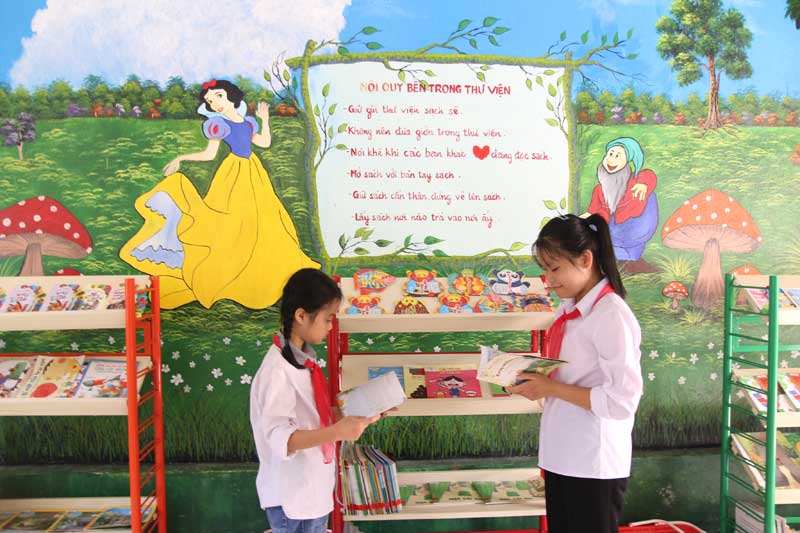
(HBO) - With the goal of helping students relax comfortably after stressful school hours and building reading skills, from the beginning of the 2019-2020 school year, Kim Tien High School and Secondary School (Kim Boi) has successfully built the "Friendly library” model in the form of socialization. Last year, the outstanding activity was that the school successfully organized the Family Reading Festival and received the positive feedback from parents, which created a pervasive effect in the community.
 The "Friendly library” of Kim Tien
Secondary & Secondary School (Kim Boi) always attracts students to read
books to improve knowledge.
The "Friendly library” of Kim Tien
Secondary & Secondary School (Kim Boi) always attracts students to read
books to improve knowledge.
Since implementing after-school activities, the teachers have instructed
the students to go to the "Friendly Library” everyday so that they can explore
different types of books, read books and stories. In addition, they have guided
them how to create a green - clean - beautiful environment, building a sense of
responsibility for the library. Up to now, there is a total of more than 8,500
books and stories of all kinds in the library. The fact that the library was
put into operation has brought confidence to the parents and the students and
the parents have participated in the reading activities with the children.
Most
of the students coming to the school library are very interested in the
bookcases and the library's decoration. With the friendly reading spaces, the
library has been helping students freely explore, freely find and read the good
books that they love. A lot of students
have improved their best ability in drawing, picture painting, storytelling and
so on. Their self-governance has also been improved.
The school's model of the "Friendly Library” has brought practical
results when it always attracts 100% of students coming there to read, exchange
and share interesting information during the breaktime and before each class.
The students seem to enter a world of books, stories with many genres such as
comic books, children's newspapers, children's stories...
On average, there are
about 100 turns of students coming to the library to study and read books
everyday. Besides, using the resources to support the change of students'
learning style and teacher's teaching methods has been creating favorable
conditions for students to access books and articles, practice the habit of
reading books to acquire and cultivate knowledge. Especially, it has helped to
strengthen skills and improve the students’ Vietnamese ability to study their
subjects well, develop the abilities and qualities and create joy when they go
to school.
With an increasingly vibrant and widespread emulation movement aimed at building cultured residential areas and cultured families, Yen Thuy District has been making steady progress toward improving both the material and spiritual well-being of its people, while fostering a civilized, prosperous, beautiful, and progressive community.
Once lacking recreational spaces and community facilities, Residential Group 2 in Quynh Lam Ward (Hoa Binh City) has recently received attention for the construction of a new, spacious, and fully equipped cultural house. The project followed the model of state support combined with public contributions in both labor and funding.
The "All people unite to build cultural life" movement, which has been effectively integrated with Kim Boi district’s socio-economic development goals, is fostering a lively spirit of emulation across local residential areas, hamlets, villages, public agencies, and enterprises. In addition, through the initiative, traditional cultural values are being preserved and promoted, while community solidarity and mutual support in poverty reduction and economic development are being strengthened.
A working delegation of the Hoa Binh provincial People’s Committee led by its Permanent Vice Chairman Nguyen Van Toan on June 11 inspected the progress of a project to build the Mo Muong Cultural Heritage Conservation Space linked to tourism services in Hop Phong commune, Cao Phong district.
Born and growing in the heroic land of Muong Dong, Dinh Thi Kieu Dung, a resident in Bo town of Kim Boi district, in her childhood was nurtured by the sweet lullabies of her grandmother and mother. These melodies deeply imprinted on her soul, becoming an inseparable part of her love for her ethnic group's culture. For over 20 years, this love for her hometown has driven Dung to research, collect, and pass down the cultural values of the Muong people to future generations.
In the final days of May, the Ethnic Art Troupe of Hoa Binh Province organized performances to serve the people in remote, mountainous, and particularly disadvantaged areas within the province. These were not just ordinary artistic shows, but they were the meaningful journeys aimed at spreading cultural values, enhancing the spiritual life of the people and contributing to the preservation of ethnic minority cultural identities.



 The "Friendly library” of Kim Tien
Secondary & Secondary School (Kim Boi) always attracts students to read
books to improve knowledge.
The "Friendly library” of Kim Tien
Secondary & Secondary School (Kim Boi) always attracts students to read
books to improve knowledge.